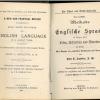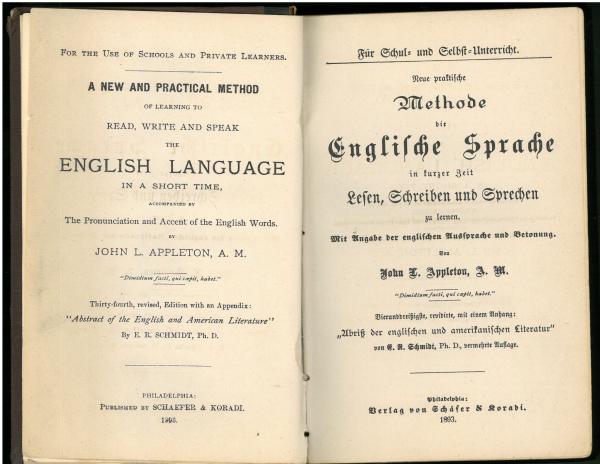Civil Rights in Iowa
| Grade | 9th -12th Grades | Class | U.S. Government | Length of Lesson | 2 days |
| Lesson Title | Civil Rights in Iowa |
| Unit Title | |
| Unit Compelling Question | Why were Civil Rights so important to American History, and why are they still important today? |
| Historical Context: This textbook, which was first created in 1893, was used to teach German speakers how to read, write, and speak English. In May 1918, Iowa Governor William Harding issued the Babel Proclamation, which made it illegal for anyone to speak any language other than English in public, in schools, and in church. In the months that followed this proclamation, textbooks like this replaced German textbooks used in places such as the Amana Colonies, where most of the population spoke German. This marked one of the first steps towards standardized education in Iowa. During the course of World War I, the resentment towards German immigrants increased when German submarines attacked U.S. passenger and merchant ships. German-Americans began to be viewed as suspicious and possibly traitors of the nation. Many believed that those speaking in German were speaking of Germany government war plans and plans to attack the United States. There was strong belief that the language of our nation had to be separated from the language of the enemy. Iowa had a large German immigrant population, the largest foreign-born population in Iowa. In some communities, such as Davenport, Iowa, it was common to hear the German language spoken in public, in schools, and in worship services. Governor Harding of Iowa began a language ban on writing and speaking German, that soon found its way into businesses, schools, and everyday life. Schools began to use English resources only, German families began to alter the spelling of their last name, common German foods were changed to a more American version and German newspaper/magazines were no longer printed. Harding found the ban legal under the First Amendment, explaining that citizens were entitled to freedom of speech as long as it is spoken in the native English language. The proclamation was repealed on December 14, 1918, however German resentment continued despite the end of the war. In 1923, the US Supreme Court granted citizens the right to speak in any language they pleased. World War I had not yet ended when Harding issued this proclamation. The war would end November 11, 1918 with the surrender of Germany. Over one hundred thousand Iowa men served in the armed forces. Many of them trained at Camp Dodge, a few miles from Des Moines, and then sailed to France to join the fighting. This textbook is in the collection of the Amana Heritage Society. |
|
| Lesson Supporting Question | |
| Lesson Overview | The unit as a whole is over the Civil Rights Movement, but will be broken down into four sections : Civil Rights, Racial Civil Rights, Women's Suffrage, and Civil Rights today. This plan is for the Racial Civil rights section, but instead we will be looking at the struggle immigrants faced when coming to this country along with some of the laws and restrictions that were put in place on these immigrants. |
| Primary Sources Used |
|
| Resources Needed | |
| Standard | |
| Lesson Target | |
| Lesson Themes | Immigrants, World War I, World War II |
|
| Formative Assessment (How will you use the formative assessments to monitor and inform instruction?) |
|
| Summative Assessment (How does the lesson connect to planned summative assessment(s)?) |
Give the students a prompt and have them write a short (1-2 page) essay on thoughts and overall experiences of activity. |
| Author | Brandon Wittstock | Created | Last Edited | ||||
| Reviewer: Dr. Lisa Millsaps, University of Northern Iowa | |||||||
| Lesson Plan Development Notes: Teaching Methods, University of Northern Iowa, Fall 2018 | |||||||


